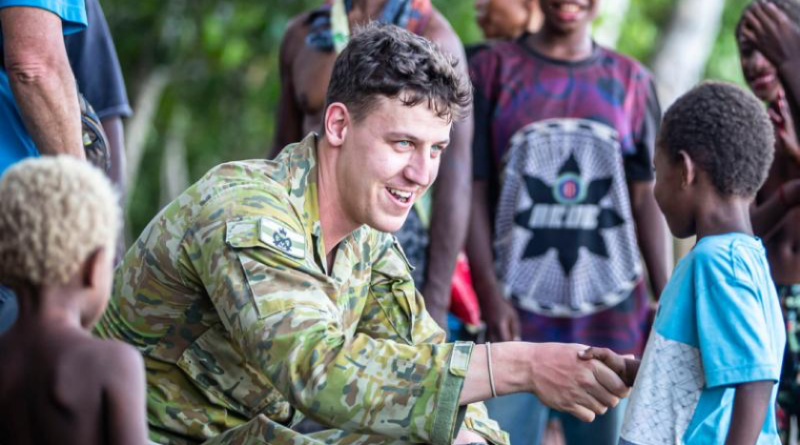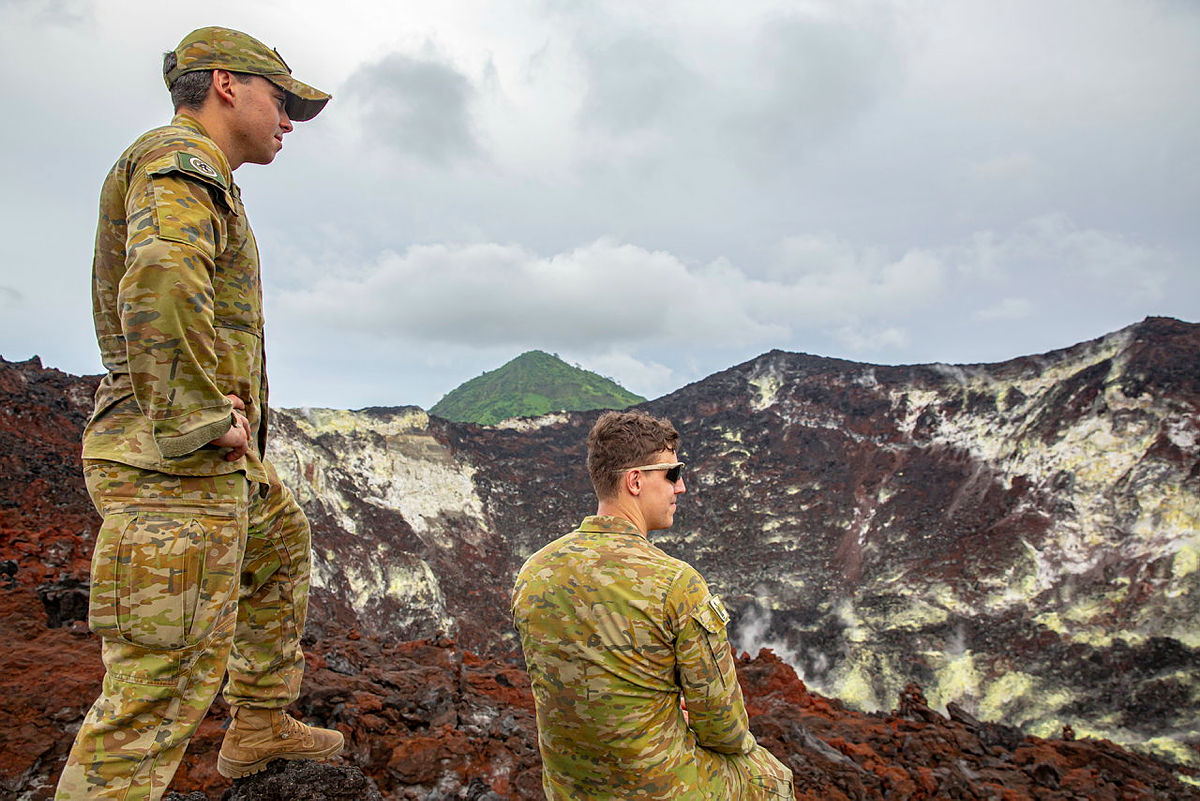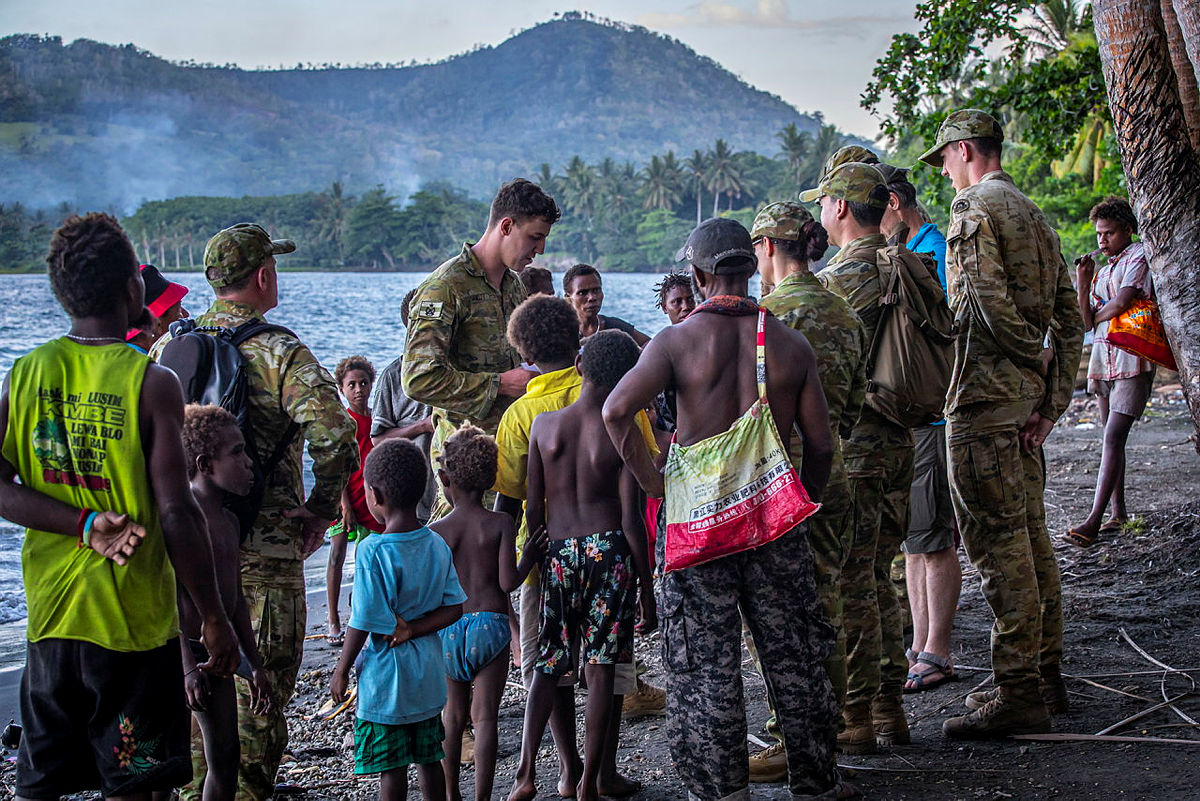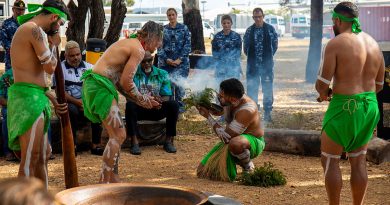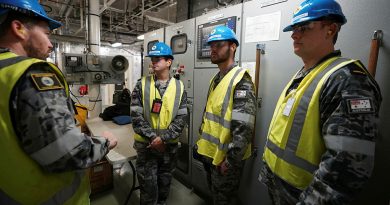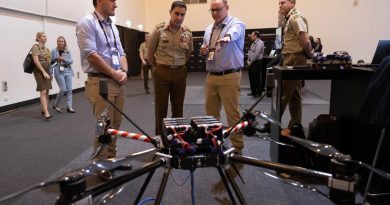Aspiring to lead in the spirit of Kokoda’s heroes
Share the post "Aspiring to lead in the spirit of Kokoda’s heroes"

When Lieutenant Lachlan Maill heard cries for help near a shopping centre escalator, he didn’t hesitate.
CAPTION: Australian Army Jonathan Church Good Soldiering Award recipient Lieutenant Lachlan Maill meets local villagers in Rabaul, PNG, during a historical battle tour. Story and photos by Corporal Melina Young.
“Whenever I’m in a situation where I can help, I always try to,” Lieutenant Maill said.
Rushing against the crowd, he reached two victims lying on the ground.
He said his confidence in training helped him push past the fear as he approached the scene.
A woman was bleeding from a stab wound to her back, and a man had been stabbed in the leg.
“I treated the lady first because she was screaming and losing a fair bit of blood; the man wasn’t as severely injured,” he said.
Lieutenant Maill had finished a gym workout and was picking up some groceries on his way home.
“I used my little towel to stop the blood flow until that got drenched in blood, then the shirt I was wearing; that’s all I had on me,” he said.
Unsure where the attacker was, he kept the crowd at bay until police arrived 20 minutes later.
Lieutenant Maill continued monitoring the injured woman, who was slipping in and out of consciousness until paramedics arrived.
Both survived the ordeal after undergoing surgery in the Darwin ICU.
Known for his calm demeanour in tough situations, the combat engineer is always willing to go the extra mile.
“I love my job, and I always valued the time I have spent getting to know the sappers and NCOs (non-commissioned officers) in my troop on a personal level; it’s the best part of command,” Lieutenant Maill said.
His dedication and leadership as troop commander earned him a Jonathan Church Good Soldiering Award.
As part of the award, recipients recently toured World War 1 and World War 2 battlefield sites in PNG, including retracing Lark Force’s escape route through the Baining Mountains after the 1942 Japanese invasion of Rabaul.
Through steep inclines and sharp descents, he reflected on the hardships faced by soldiers unfamiliar with the jungle.
“The soldiers’ main defence was located around the northern coastal area and they didn’t know the terrain they were withdrawing through,” he said.
“The landscape can be brutal – it made me think about how I would lead and motivate my troop through similar challenges.”
While in East New Britain, Lieutenant Maill embraced every opportunity to engage with children.
“These kids don’t have much, but they’re always so happy with what they do have,” he said.
CAPTION:Lance Corporal Lachlan Goulding, left, and Lieutenant Lachlan Maill overlook the crater at the top of Mount Tavurvur, East New Britain’s active volcano in PNG.
Lieutenant Maill stood at the crater of Mount Tavurvur, taking in the same view of Simpson Harbour that Japanese forces saw when they invaded Rabaul in January 1942.
The strategic, deep-water harbour was key for Japan. They were positioned close to their naval base in the Caroline Islands, cutting communications between the US and Australia.
On Vulcan Beach, where countless lives were lost, Lieutenant Maill delivered a brief about Major Bill Owen, who led Alpha Company of the 2/22nd Battalion and fought against the invasion.
The men of Alpha Company, despite being in poor health, maintained a successful defence for several hours, firing everything they had. However, supplies were low.
They were ill-equipped to defend themselves when dawn broke and a 5000-strong force, including 50 ships and an aircraft carrier, entered Simpson Harbour.
The order to retreat was given. They had to escape or die.
CAPTION: Lachlan Maill delivers a presentation at Vulcan Beach in Rabaul, PNG, to fellow recipients and local villagers at the location where Major Bill Owen commanded the troops of Alpha Company 2/22nd Battalion.
Elements of Lark Force spent months on the run after Rabaul’s fall, with some soldiers fleeing by small boats while others were captured, killed or died from disease.
Among the survivors was Major Owen, who trekked through the Baining Mountains with 400 others.
Returning to Australia, Major Owen was promoted to Lieutenant Colonel. He was flown back to PNG where he commanded the 39th Battalion.
In July 1942, battles at Oivi and Gorari brought heavy losses to Major Owen’s force and they withdrew to Kokoda.
In close combat fighting on the Kokoda track, designed to delay the enemy’s advance, he was shot above the right eye while throwing grenades and died soon after.
This earned him the first Distinguished Service Cross to be awarded to an Australian – the second highest US military decoration for bravery in combat.
“He didn’t need to be that far forward, but that’s the kind of leader he was – always in the fight with his men and I really respect and aspire to that,” Lieutenant Maill said.
.
.

.
.
Share the post "Aspiring to lead in the spirit of Kokoda’s heroes"

